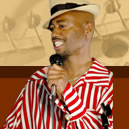| "Loose Me”: A Reflection on Liberation from AIDS Stigma
By Craig Washington, MSW
As Black people living with AIDS for nearly 30 years, we have been burdened by stigma that had taken root decades before this epidemic emerged. The stigma associated with AIDS, our negative attitudes and beliefs about those who are HIV infected, and the practices driven by our prejudices, is a festered outgrowth of the stigmas attached to race, gender, sexual orientation, sexuality, poverty and addiction. To address AIDS stigma is to address what it means and what it costs to be black, homosexual, living on low or no income, woman, transgender, man, addict, to be sexual, to be human. We are also called to address the health disparities and social injustice that trouble those meanings and jack up those costs.
Gay men and transgenders, deemed as perverse, and largely blamed for the epidemic, are the most heavily stigmatized of all affected groups. Women living with HIV face violence, abuse and judgment from within black communities as well as white dominated society. The dehumanization of gay men, transgenders and women is jointly rooted in norms of heterosexual male dominance that black people value as revered traditions. Those who are poor are most vulnerable to abuse, motivated and justified by stigma.
Black people who are HIV-positive and those groups most profoundly affected by AIDS are devalued, discounted and discriminated against. HIV-related stigma takes its toll on our mental and physical health, self esteem, quality of care, and the effectiveness of prevention efforts. It limits our access to income, housing and healthcare, and providers’ willingness to deliver treatment. It operates on institutional, community, social network and individual levels. Accordingly the response to move beyond stigma must be comprehensive and root-focused.
As individuals we may begin by examining the roots of our own anxieties around expressions of gender and sexuality and examine why we are disturbed by them. Through dialogue we can challenge and be challenged by those in our inner circles regarding our fears and hostilities toward those whose behaviors, appearances, identities are culturally outlawed. On a community level, cultural agents such as progressive places of worship, discussion groups, black feminist forums and art related activities that affirm sexuality and welcome lgbt people may yield positive impact. Parents with young children can be guided to better support their daughters to be confidant and self loving, and teach their sons to respect women and girls. Our teachers, religious leaders, community organizers, elected officials, all whom influence our beliefs and how we treat one another must be held accountable regarding how they practice inclusivity and promote understanding. HIV interventions designed for stigmatized groups can encourage self acceptance and pride by providing leadership opportunities and messages that acknowledge their strengths. Client centered interventions such as syringe exchange programs are shown to be effective and thus merit full legalization. We need to be on this front to remove ideological and bureaucratic barriers to good prevention work.
We also must initiate and sustain local and statewide community involvement, and grass roots action to ensure that people have what they need to lead stable and fulfilling lives. AIDS advocacy and service organizations can train and engage people in advocacy and policy work to achieve fair-minded policies, better health services, more job opportunities and affordable housing for their own communities. We have to move beyond service and crisis management to influence legislation, policy and budget decisions that ensure people have all that they need to reach their fullest potential and increase their self sufficiency.
To liberate ourselves from this profound and pervasive stigma and its effects, we must relinquish those traditions that are toxic and accept the uncomfortable, yet undeniable truths about ourselves. We have to confront the realities and possibilities of sexuality as fluid not fixed, gender as multiple and not binary, manhood as human and not anti-woman. Black people need more evidence of black love that is elastic and enduring, a love that stretches to embrace our diversities and welcome those among us whom we have shunned.
back to top
|









